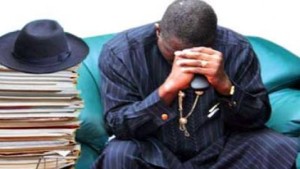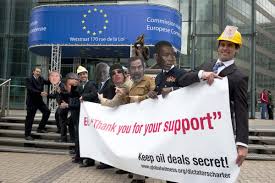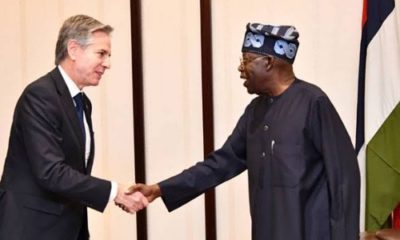Finance
$1.1billion Fraud: British Judge questions Jonathan’s integrity, stops Etete from getting N17 billion
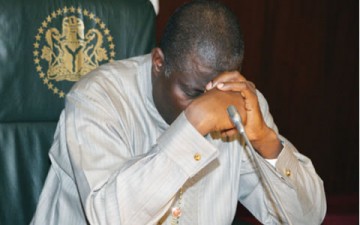
LONDON-A British Judge on Tuesday refused to release $85 million (N17 billion) to Malabu, a fraudulent company controlled by Nigeria’s former petroleum minister, Dan Etete.
In refusing to release the money to Malabu, Justice Edis of the Southwark Crown Court declared that he was not sure the administration of President Goodluck Jonathan acted in Nigeria’s interest when it approved the transfer of the money to Malabu.
“I cannot simply assume that the FGN which was in power in 2011 and subsequently until 2015 rigorously defended the public interest of the people of Nigeria in all respects,” the judge ruled.
PREMIUM TIMES had reported how the Jonathan administration controversially approved the transfer of $1.092 billion from Nigeria’s JP Morgan account in London to Nigerian accounts controlled by Malabu.
The money was paid by global oil giants, Shell and ENi, for Africa’s richest oil bloc, OPL 245.
The former Attorney General of the Federation, Mohammed Adoke, and the former Minister of State for Finance, Yerima Ngama, signed the documents approving the transfer to Malabu.
The fraudulent deal, shaded in various layers of corruption, has been condemned by Nigerians and international transparency advocates and is being investigated by authorities in four different countries.
The seized $85 million
The $85 million was seized at the request of Italian prosecutors who are also investigating the deal. The money was the last part of the OPL 245 largesse not yet distributed.
Sensing that the Muhammadu Buhari administration was yet to find its feet on international legal matters, Mr. Etete approached the British court and asked that the money be returned to him.
At a two-day hearing that started on November 23, Mr. Etete’s lawyers argued that there was no fraud in the deal and asked that the money be released to him.
While Mr. Etete argued that the money be released to him, the Italian prosecutor argued that “their investigation could lead to a potential forfeiture of the money down the road.” a source who has followed the case and was present at the proceedings told PREMIUM TIMES.
Malabu’s lawyers told the court that freezing the money was an assault on Nigeria and questioned how the court could imagine that Messrs. Adoke and Ngama would be a party to a corrupt deal.
The ruling
While giving his ruling on Tuesday, Justice Edis said while he could not say for certain if the deal was fraudulent pending conclusions of investigations, it would be inappropriate to release the money to Malabu.
“I am not making any findings of fact about misconduct by anyone. I am simply assessing the evidence before me to determine whether a restraint order should be discharged which was granted by way of MLA (Mutual Legal Assistance between the UK and Italy) to support an investigation by the Italian authorities,” the judge said.
The judge also made reference to evidence provided by the Italian authorities that ex-President Jonathan was directly involved in the fraudulent deal.
“The suggestion from the wiretaps is that “Fortunato” was implicated and I am told that this was a reference in code (not subtle) to the former President of Nigeria, President Goodluck Jonathan,” the judge said.
“Aliyu (Abubakar) is said to be associated with him and Aliyu received, in a way which was not transparent, $523m of the money paid for the OPL 245 licence in August 2011.”
PREMIUM TIMES had reported how fictitious companies owned by Abubakar Aliyu, a man referred to as ‘Mr. Corruption’ by anti-graft officials, received over half ($532 million) of the total $1.092 billion.
Mr. Aliyu, a close ally of Mr. Jonathan was recently quizzed by EFCC operatives for the first time despite being a central character in the deal whose investigation was virtually stalled during the Jonathan presidency.
Activists react
Reacting to the ruling, Simon Taylor of Global Witness stated that “Given the gathering pace of the EFCC investigation in Nigeria under new leadership and a call by the Nigerian House of Representatives to cancel the deal in 2014, investors in Shell and Eni should demand to know why they were exposed to such risk.”
The UK based Global Witness has been at the forefront of the demand for transparency in the deal and other similar deals across the world.
Also reacting to the judgement, Dotun Oloko, an anti-corruption campaigner in Nigeria said, “In light of these allegations in a UK court, the role of the senior Nigerian officials involved in this deal, including Goodluck Jonathan, must now be fully investigated.”
With the ruling, Nigerian now has the opportunity to not only claim the money but also another $110.5 million of the funds held in a Swiss bank while investigations continue.
Below is a statement by Global Witness after the court ruling:
Court refuses to unfreeze funds from “smash and grab” raid on Nigerian oil block
Prosecutors allege that “fronts for President Goodluck Jonathan of Nigeria” received US$523m in proceeds of “smash and grab” OPL 245 deal
Southwark Crown Court today rejected an attempt by a company owned by the former Nigerian oil minister Dan Etete to unfreeze US$85m in proceeds of the corrupt deal for the Nigerian offshore oil block, Oil Prospecting Licence 245 (OPL 245), which was sold to Shell and Eni for $1.1bn in 2011.
The funds were restrained at the request of Italian authorities, who are investigating the sale of the block by Malabu Oil & Gas, a company secretly owned by Mr Etete, to the international oil companies.
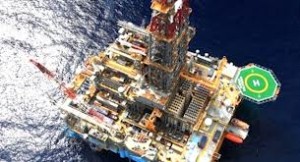 The Federal Government of Nigeria (FGN) under Goodluck Jonthan acted as a middleman in the deal, and the court received evidence based on wiretaps that prosecutors allege show that the then President, Goodluck Jonathan, was directly involved. The deal deprived the Nigerian people of a sum equivalent to 80% of the country’s 2015 health budget.
The Federal Government of Nigeria (FGN) under Goodluck Jonthan acted as a middleman in the deal, and the court received evidence based on wiretaps that prosecutors allege show that the then President, Goodluck Jonathan, was directly involved. The deal deprived the Nigerian people of a sum equivalent to 80% of the country’s 2015 health budget.
“In light of these allegations in a UK court the role of the senior Nigerian officials involved in this deal including Goodluck Jonathan must now be fully investigated,” said Dotun Oloko, a Nigerian anti-corruption campaigner.
Evidence from US authorities presented to the court and included in the judgement “shows payments following circuitous routes which total $523m and which arrived at Abubakar Aliyu, aka ‘Mr Corruption’” […] “Aliyu’s companies are allegedly fronts for President Goodluck Jonathan of Nigeria”. The Crown Prosecution Service, acting at the behest of the Public Prosecutor for Milan (PPM), described OPL 245 as a case of “grand corruption”.
The OPL 245 deal is currently under investigation by the Public Prosecutor of Milan, the UK’s National Crime Agency (NCA), and the Nigerian Economic and Financial Crimes Commission (EFCC). The EFCC have reportedly recently interviewed Abubakar Aliyu in connection with the case, and earlier this year interviewed Dan Etete.
Justice Edis of Southwark Crown Court turned down Malabu’s application to discharge the freezing order rejecting Malabu’s arguments that the Crown had failed to follow proper procedures in securing the freezing. Justice Edis concluded in his judgement:
It is extremely important that what I am about to say is not misunderstood. I am not making any findings of fact about misconduct by anyone. I am simply assessing the evidence before me to determine whether a restraint order should be discharged which was granted by way of MLA to support an investigation by the Italian authorities. That investigation is not complete (and appears to be still at quite an early stage). What misconduct it may ultimately prove, if any, will be a matter for the PPM and the Italian court if proceedings are brought.
However, precisely because I cannot reach firm factual conclusions, I cannot simply assume that the FGN which was in power in 2011 and subsequently until 2015 rigorously defended the public interest of the people of Nigeria in all respects. Mr. Fisher QC who appeared for the CPS used the phrase “grand corruption” to describe the form of corruption in which the state itself is culpable.
The suggestion from the wiretaps is that “Fortunato” was implicated and I am told that this was a reference in code (not subtle) to the former President of Nigeria, President Goodluck Jonathan. Aliyu is said to be associated with him and Aliyu received, in a way which was not transparent, $523m of the money paid for the OPL 245 licence in August 2011.
“Given the gathering pace of the EFCC investigation in Nigeria under new leadership and a call by the Nigerian House of Representatives to cancel the deal in 2014, investors in Shell and Eni should demand to know why they were exposed to such risk,“ said Simon Taylor, a Director of Global Witness.
Suspects named in the Italian case include Eni and its current and former CEOs Claudio Descalzi and Paolo Scaroni, as well the company’s Chief Development, Operations & Technology Officer Roberto Casula and former executive Vicenzo Armanna. Other suspects in the Italian case include Dan Etete and middlemen Emeka Obi, Gianluca Di Nardo and Luigi Bisignani. Shell and Eni have denied any wrongdoing.
“It is clear from evidence in the public domain that high level executives in Shell personally took part in negotiating this deal. Citizens in the UK, US, Netherlands and Nigeria should demand that Shell and its executives are investigated in their respective countries,” said Nicholas Hildyard of The Corner House.
Shell and Eni have invested at least $1.8bn in purchasing and developing the block, which they own 50-50. It reportedly holds probable reserves of 9.23 billion barrels of oil, which if proven, would represent the equivalent of a third of Shell’s proven reserves, and two thirds of Eni’s.
Antonio Tricarico of Re:Common said: “$85 million paid by Eni and Shell for the benefit of Dan Etete’s company Malabu remains frozen in London. The time has come that Eni and Shell come clean about what they knew about this deal and who else this money was intended for.”
Premium Times-
Banking
CBN Denies Currency Devaluation

The Central Bank of Nigeria (CBN) has refuted claims of devaluing the.
Earlier reports suggested that the CBN had devalued the Naira, lowering its exchange rate from N631 to the dollar, compared to the previous day’s rate of N461.60 at the Importers and Exporters (I&E) window.
However, the Central Bank of Nigeria (CBN) released a statement on Thursday through its Acting Head of Corporate Communications, Dr. Isa Abdulmumin, categorizing the report as false information.
In the statement titled ‘CBN Has Not Devalued The Naira’, he said the attention of the apex bank was drawn to the news report by an Abuja based newspaper edition of June 1, 2023, titled “CB Devalues Naira To 630/51”.
However, the CBN stated categorically that the news report was replete with outright FALSEHOODS and destabilizing innuendos, ‘reflecting potentially willful ignorance of the said medium as to the workings of the Nigerian Foreign Exchange Market.’
“For the avoidance of doubt, the exchange rate at the Investors’ & Exporters (I&E) window traded this morning (June 1, 2023) at N465/USS1 and has been stable around this rate for a while.
“The public is hereby advised to ignore the news report by Daily Trust in its entirety, as it is speculative and calculated at causing panic in the market,” the CBN spokesman added.
He, therefore, advised media practitioners to verify their facts from the Central Bank of Nigeria before publishing in order not to misinform the public.
Banking
BREAKING: CBN Increases Interest Rate By 0.5%

The interest rate in Nigeria has been raised to 18.5 percent, up by 0.5 percent, from 18 percent where it was pegged in March 2023.
The Central Banks of Nigeria’s (CBN) Monetary Policy Committee (MPC) resolved to this effect at its third meeting of 2023 in Abuja, on Wednesday.
Governor, CBN, Godwin Emefiele, made the disclosure in the communiqué of the MPC’s meeting, thereafter.
While engaging the media at the end of the two-day meeting, Emefiele, said the committee voted to keep the asymmetric corridor at +100 and -700 basis points around the MPR.
In the view of the MPC, rising inflation rate is traceable to the high energy cost and challenges around the supply chain, among others, which lie outside the corridors of the CBN.
Emefiele said, “The current trend in price development would continue to be monitored by the bank with greater collaboration with fiscal authority to address the drivers of inflation.”
Biztellers reports that the CBN had effected six consecutive interest rate increases, which has seen the rate move from 11.5 percent in March 2022 to 18.5 percent in May 2023.
Finance
Dangers Lurk As Nigerians Resort To Refurbished Gas Cylinders

In Nigeria, people have been forced to come up with creative solutions to cope with the effects of inflation and the economic crisis.
These improvised strategies have not only helped individuals save money, but also enabled them to stay afloat during difficult times.
In a concerning development, the recent trend of boycotting the high cost of cooking gas cylinders in Nigeria may pose a greater risk to lives than it does in terms of saving money.
Economy&Lifestyle investigations have revealed that the soaring prices of gas cylinders have reached a point where it has become increasingly challenging for average households to afford them, let alone refill them with gas.
The situation is further exacerbated by the fact that the pump price of kerosene, which would typically serve as an alternative, has become prohibitively expensive.
Upon investigation, it was found that the prices of gas cylinders vary depending on their sizes. A 3kg gas cylinder is priced at N14,000, while a 5kg cylinder costs N16,000. The larger cylinders are even more costly, with a 6kg cylinder priced at N17,000 and a 12.5kg cylinder costing N19,000.
Additionally, the expense continues when it comes to filling these cylinders with cooking gas, as it costs N2,600 for a 3kg cylinder, N5,200 for a 6kg cylinder, N8,950 for a 10.5kg cylinder, and N10,650 for a 12.5kg cylinder.
Consequently, an average household that needs to replace a worn-out 5kg cylinder would have to come up with N20,250 to purchase a new cylinder and fill it with gas, which can be a difficult feat to achieve.
As a result, many people have resorted to refurbishing their old cylinders and trying to use them as best as they can. However, this approach poses a significant danger.
Mrs. Rukayat Adesoji, a trader, shared her experience regarding her gas cylinder, which had become rusted and could no longer stand upright since last month. Due to the exorbitant prices of purchasing new cylinders, she resorted to seeking the assistance of a welder.
The welder patched the legs of the cylinder, repainted it, and ever since then, she has been using the refurbished cylinder for her cooking needs.
She said ““My gas cylinder which was 6kg got rusted and no longer stands erect since last month. When I asked for the price, I was told it was N17, 500. I was discussing it with a friend who advised me to take it to a welder to paint it and construct a new stand. I heeded to her advice and at the end spent just N3, 000 to turn my cooking gas to a brand new.”
Apart from refurbishing cylinders, some people don’t even know when their cylinders will expire. Mrs. Mercy Opara, a hair stylist, falls in that category as she explained: “I am taking my gas cylinder to the welder to spray it for me. It just cost N1, 500.
“The cost of buying a new cylinder is high. I have been using my cylinder for over 7 years and I don’t even know the expiry date. I just pray God blesses me so that I can buy a new one. But this one I am managing will look neat after spraying it for another two years.”
Mr. Adekanbi Joseph, a wielder, said he paints cylinder and “To paint and rebuild a cylinder stand, I charge N4, 500. Many people come here to paint as a new cylinder is now very expensive to get.”
Highlighting the potential dangers of using refurbished cylinders, Mr. Benjamin Hope, the Chief Executive Officer of FKT Cooking gas and general goods, emphasized the risks involved.
He stated that even a brand new cylinder can pose a risk of explosion if the locks are not properly secured after use or if the cylinder filled with gas is moved from one location to another.
He said “A brand new cylinder can explode if the locks are not well keyed after using and if the cylinder filled with gas was moved from one place.
“There are many reasons for the high cost of gas cylinders in Nigeria. One is the cost of importation due to the exchange rate. Another is the increased migration from the use of kerosene to cooking gas which has necessitated increased demand for gas cylinders. You know that in such a case there will be increased importation of cylinders.”he added

